Bent metal, stunning visuals, and heart racing gameplay: Few words can describe the sheer amount of detail put into Project CARS, a racing simulator developed by Slightly Mad Studios. At first glance, the game would appear to have been made by a major publisher’s developers such as EA or Ubisoft. However, the reality is that Project CARS was developed by a small team whose origins can be traced back to Need For Speed: Shift. Slightly Mad Studios, which is based out of the U.K. and is comprised of just over 100 employees. When juxtaposed with the larger developers that can range from 350-800 employees, this number seems relatively tame. If this game proves anything about AAA game development, it is that beautiful games do not require a ludicrous amount of employees and funding. This alone drew my attention to Project CARS. 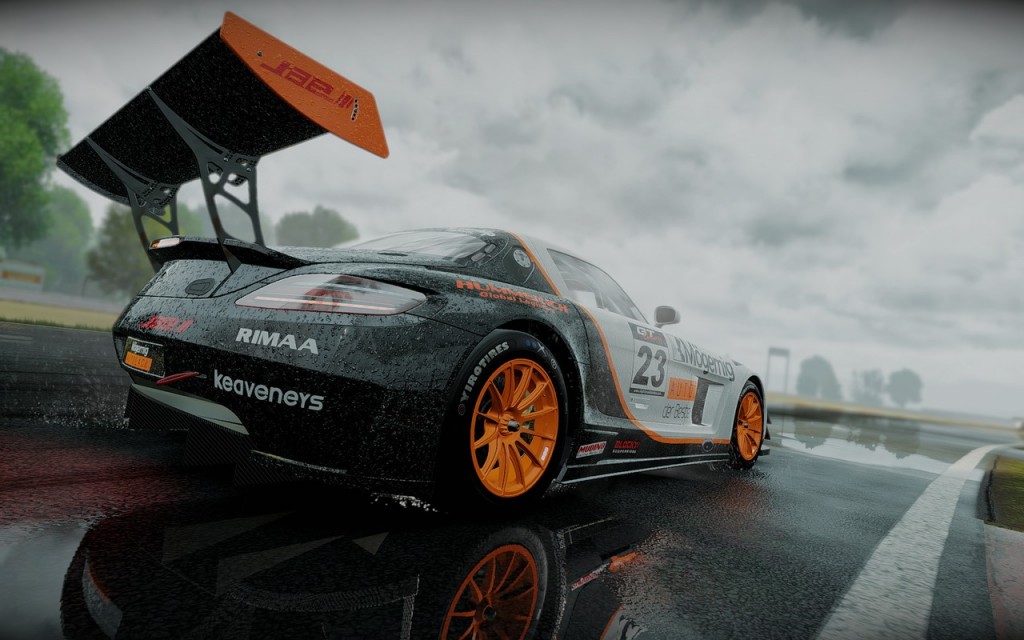 Racing simulators, for those unaware of the specifics of the genre, attempt to encapsulate a realistic approach to racing. Easily distinguishable from more arcade racers such as Midnight Club or Burnout, racing sims convey the more serious aspects of circuit racing. Other noteworthy racing sims are the Forza & Gran Turismo franchises, yet these two are isolated to either the Xbox or Playstation platforms. Project Cars, on the other hand, is available on multiple platforms from the PC to the WiiU. Obviously, the most unique experience will be on the PC, which is my platform of choice for the game. At the same time, however, I am incredibly satisfied by this small team of developers’ ability to put out their game on so many platforms (the Thursday release on the PC was also a nice change).
Racing simulators, for those unaware of the specifics of the genre, attempt to encapsulate a realistic approach to racing. Easily distinguishable from more arcade racers such as Midnight Club or Burnout, racing sims convey the more serious aspects of circuit racing. Other noteworthy racing sims are the Forza & Gran Turismo franchises, yet these two are isolated to either the Xbox or Playstation platforms. Project Cars, on the other hand, is available on multiple platforms from the PC to the WiiU. Obviously, the most unique experience will be on the PC, which is my platform of choice for the game. At the same time, however, I am incredibly satisfied by this small team of developers’ ability to put out their game on so many platforms (the Thursday release on the PC was also a nice change). 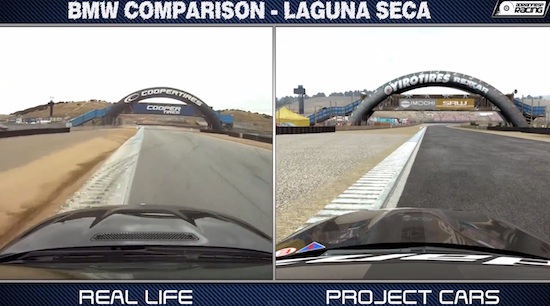 From the moment that the game is booted up, the visuals are the first aspects of the game that stand out the most. I was met with near photo-realistic quality. This amount of detail and hard work put in by the team absolutely accomplished its goal of putting the player behind the wheel of a super car. In other words, everything from the rain drops running down the side of the cars to the unique shadows and lighting exemplify and champion the art of artistic game design (photo-realistic comparison is above). Another small detail that was quite enjoyable was the physics behind leaves and debris on the track. Leaves mask the trail and rush of air behind your vehicle, almost like a small tornado. The amount of time dedicated in order to accomplish such a small feat truly displays this hardworking team of developers’ pride in its work. This alone set them apart from more “mainstream” developers.
From the moment that the game is booted up, the visuals are the first aspects of the game that stand out the most. I was met with near photo-realistic quality. This amount of detail and hard work put in by the team absolutely accomplished its goal of putting the player behind the wheel of a super car. In other words, everything from the rain drops running down the side of the cars to the unique shadows and lighting exemplify and champion the art of artistic game design (photo-realistic comparison is above). Another small detail that was quite enjoyable was the physics behind leaves and debris on the track. Leaves mask the trail and rush of air behind your vehicle, almost like a small tornado. The amount of time dedicated in order to accomplish such a small feat truly displays this hardworking team of developers’ pride in its work. This alone set them apart from more “mainstream” developers. 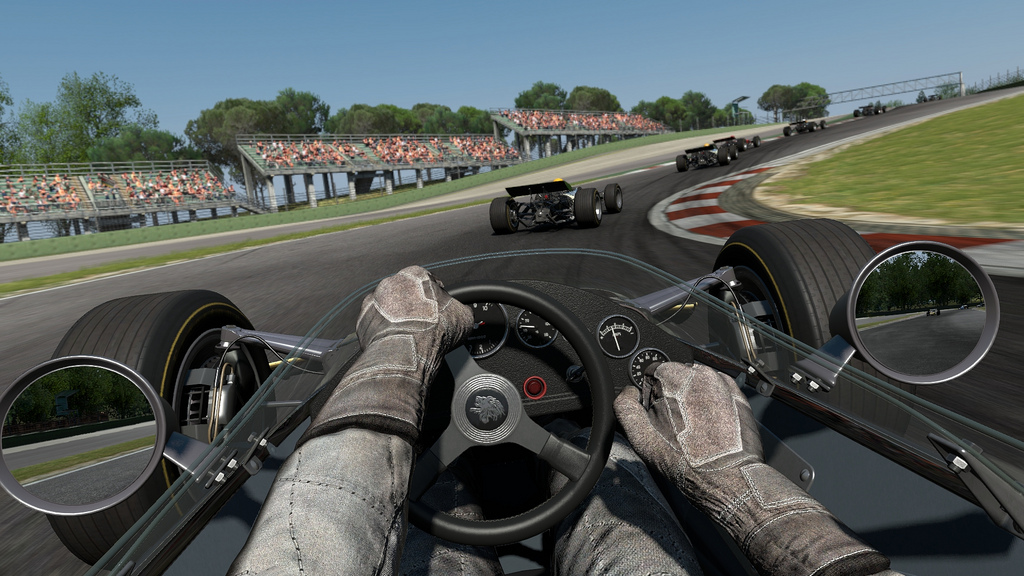 Graphics in racing games can only help polish the games’ end result. Gameplay ultimately makes or breaks racing games. That being said, I have found my time with Project CARS incredibly difficult but rewarding. All actions and shifts of the steering wheel have drastic effects on the handling of the cars. The slightest wrong twitch can send your priceless car into the side of an unwelcoming wall or fellow racer. Project CARS manages to break down the aspects of racing to almost an art, which sounds poetic but is nonetheless true. Rain, which normally is a minor setback in other racing games, truly can screw the player over if the wrong set up is used. The types of tires, break pressure, and even the temperature of the breaks all affect the player’s ability to navigate in the rain. Driving without rain in this game is already difficult enough at times, and rain just makes Project CARS even more realistic and difficult. Ironically, I found the driving mechanics in the game to be not only fair, but also quite easy to understand. The game explicitly explains to the player what different tunes and options on your car will result in on the track. The game does not hold the player’s hand. Rather, it attempts to guide the player in explaining how things such as qualifier rounds and grid set ups can affect your performance. The game itself is far more intuitive and has far more depth than it lends itself to at first glance.
Graphics in racing games can only help polish the games’ end result. Gameplay ultimately makes or breaks racing games. That being said, I have found my time with Project CARS incredibly difficult but rewarding. All actions and shifts of the steering wheel have drastic effects on the handling of the cars. The slightest wrong twitch can send your priceless car into the side of an unwelcoming wall or fellow racer. Project CARS manages to break down the aspects of racing to almost an art, which sounds poetic but is nonetheless true. Rain, which normally is a minor setback in other racing games, truly can screw the player over if the wrong set up is used. The types of tires, break pressure, and even the temperature of the breaks all affect the player’s ability to navigate in the rain. Driving without rain in this game is already difficult enough at times, and rain just makes Project CARS even more realistic and difficult. Ironically, I found the driving mechanics in the game to be not only fair, but also quite easy to understand. The game explicitly explains to the player what different tunes and options on your car will result in on the track. The game does not hold the player’s hand. Rather, it attempts to guide the player in explaining how things such as qualifier rounds and grid set ups can affect your performance. The game itself is far more intuitive and has far more depth than it lends itself to at first glance. 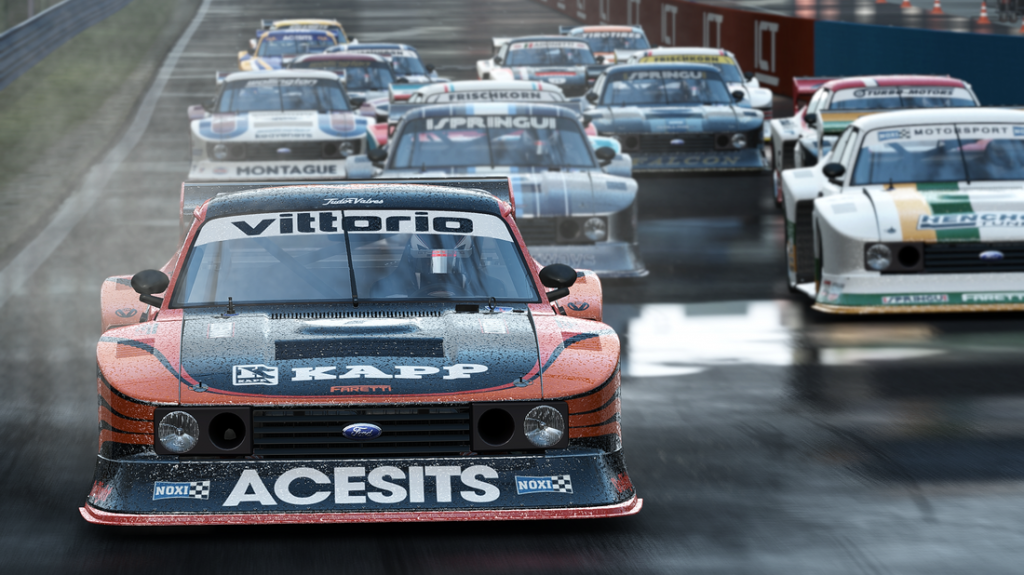 The cars themselves in the game are also a specific asset when it comes to the gameplay as a whole. In some races, the player will be racing against 20 identical cars that only vary when it comes to finite tuning adjustments. In other races, the player will pick a specific car from a preset class. Regardless, the game’s fair level playing field of giving each racer the same fully upgraded car truly helps distinguish an average racer from a pro. Players can’t depend on better upgrades or cash to pay for better parts. Instead, the skill of the player ultimately proves to be the defining factor between finishing first or last. The game accomplishes these fair playing field conditions by placing the player essentially on a racing team sponsored by a group. In these leagues that the teams compete in, all cars are the same, and all assets are shared. The tournaments themselves occur on a calendar reminiscent of my pro player on Fifa or any other sports game. Races are set in advance and are normally divided into days. This adds a sense of reality and depth to the game. Many racing games have the player magically appear at a starting line, only becoming aware of where they are going to race moments before. Project Cars allows the player to glimpse months ahead into their schedule in order to prepare for the different tracks and cars allowed in upcoming races. It truly feels like a professional and realistic experience, or as close to one as the average player can get to actually racing a two million dollar car down the Mercedes Benz test track in Germany.
The cars themselves in the game are also a specific asset when it comes to the gameplay as a whole. In some races, the player will be racing against 20 identical cars that only vary when it comes to finite tuning adjustments. In other races, the player will pick a specific car from a preset class. Regardless, the game’s fair level playing field of giving each racer the same fully upgraded car truly helps distinguish an average racer from a pro. Players can’t depend on better upgrades or cash to pay for better parts. Instead, the skill of the player ultimately proves to be the defining factor between finishing first or last. The game accomplishes these fair playing field conditions by placing the player essentially on a racing team sponsored by a group. In these leagues that the teams compete in, all cars are the same, and all assets are shared. The tournaments themselves occur on a calendar reminiscent of my pro player on Fifa or any other sports game. Races are set in advance and are normally divided into days. This adds a sense of reality and depth to the game. Many racing games have the player magically appear at a starting line, only becoming aware of where they are going to race moments before. Project Cars allows the player to glimpse months ahead into their schedule in order to prepare for the different tracks and cars allowed in upcoming races. It truly feels like a professional and realistic experience, or as close to one as the average player can get to actually racing a two million dollar car down the Mercedes Benz test track in Germany. 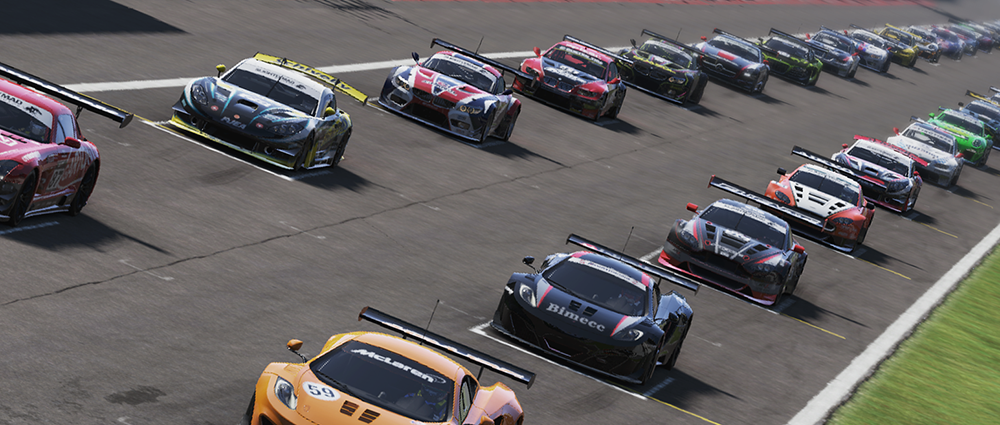 To top off the already incredibly well-made game, the developers have made a phenomenal multiplayer environment. On the PC at least, weekly tournaments and competitions are hosted for various prizes, including some actual cash prizes. The community as a whole is incredibly welcoming, and different brackets for various skill levels of players are available. The developers behind Project CARS have succeeded in making a game with a devoted and deeply interested community. This in turn will increase the longevity of the game and hopefully the game series.
To top off the already incredibly well-made game, the developers have made a phenomenal multiplayer environment. On the PC at least, weekly tournaments and competitions are hosted for various prizes, including some actual cash prizes. The community as a whole is incredibly welcoming, and different brackets for various skill levels of players are available. The developers behind Project CARS have succeeded in making a game with a devoted and deeply interested community. This in turn will increase the longevity of the game and hopefully the game series.
Verdict: 9/10 – Though it lacks the large roster of its competitors in this genre of gaming, Project CARS instead provides the players with an incredibly realistic environment. The attention to detail and the overall graphics of the game are easily the best in the industry at the moment, but, at the same time, the game delivers a precise and fair version of racing gameplay.
